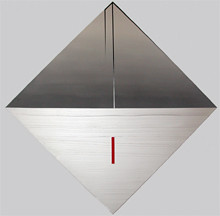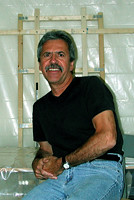BELISARIUS: REFLECTIONS/John Brunetti
Dan Ramirez
BELISARIUS: REFLECTIONS
NEW PAINTINGS
KLEIN ART WORKS
CHICAGO, ILLINOS
JANUARY 8 – FEBRUARY 19, 2000
John Brunetti, Art Critic
Nothing is certain when your about.” Samuel Beckett, Waiting for Godot
This dialogue from the Irish playwright’s spare, modernist work epitomizes Dan Ramirez’s oeuvre. More importantly, the play’s exploration of the cycle of death, redemption and re-birth can be seen as a metaphor for this significant artist’s return to his hometown after a ten year absence, and his accompanying artistic rejuvenation. Indeed Beckett’s own descriptions of his play, “a matter of fundamental sounds…striving all the time to avoid definition,’ uncannily suggest Ramirez’s minimalist, music-inspired compositions of the 70’s and 80’s, as well as the resurrection of their signature vocabulary in his current paintings. Though familiar, his formal elements—monolithic, shimmering vertical bands, evanescent gradations of tone, razor-thin tapering bars—resist easy categorization. They neither reveal absolute truths, nor deconstruct systems of logic. Instead, they are always intuitive and emotional expressions of the artist’s deepest personal responses to his life. However, it is Ramirez’s unspoken, albeit unlikely, kinship with another modern master of stillness and shifting perceptions, the painter and sculptor Alberto Giacometti , that allows insight into his veiled language. For both artists, sight is paramount and always suspect. The elusiveness of an edge between a shape and its surrounding space reveals the fiction behind complete comprehension of our environment, and our relationship to it. The internal conflicts that arise from the resulting reverberations make palpable the renewal of Ramirez’s distinctive voice.



2 Comments:
I have just begun reading the articles posted on your site. First, let me say, as best I can judge from the smallish photos, your art is remarkably graceful, lyrical, moving--I do not know the proper language. I am no art critic; I only know what I like. I was rather taken by the comments of John Brunetti, who starts out quoting Beckett, "Nothing is certain when you're about." The selection in itself seemed high praise. As you know, I am a philistine who happens to like Pollock (among others, naturally) and I like him, in part, for this very reason. I have a preference for art that does not readily fall into a conceptual category, that does not insist too strongly on saying something that has been said, and heard. It does sound like Brunetti is a perceptive critic (and a rather good writer, I think) for even a cave-dweller like myself can sort of see what he is getting at. The Hearing #IV does somehow elude both assertion and counter-assertion, as Brunetti suggests. (However, the photo does make it a bit more challenging than I would like.) Brunetti writes something I find interesting: "The elusiveness of an edge between a shape and its surrounding space reveals the fiction behind complete comprehension of our environment, and our relationship to it." I certainly can see the application of this remark to your work, but what he has written reads rather like a formula. Is he, at this point, commenting about "an edge" as it appears in your work, or is he making a universal statement about art that no one would contest? I just wondered. It is consonant with your delight in the Tractatus, its power to withhold at least as much as it gives.
AHA! I knew you would have something perceptive to say.
I think what Brunnetti is referring to when he speaks of the "edge" is some metaphorical relationship to how it is used in the painting and how that corresponds to some idea I have about reality and illusion in "real time." I think that is the comparison that he is alluding to in his use of Beckett as a basis of comparison. Ultimately, I think what he is dealing with, at least I would hope he is, is perception, both physical and conceptual. If he is, then he is coming very close to some of the issues that inform my work. That's just a guess on my part but I do know john's writing and he has never come across as someone who has a formula by which he expresses his thoughts on a given subject.
Thanks for the comment. I am very interested on how you will respond to the two essays that I mentioned.
Post a Comment
<< Home